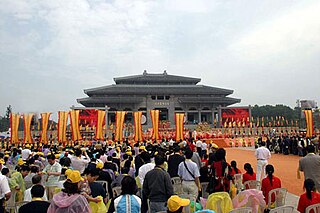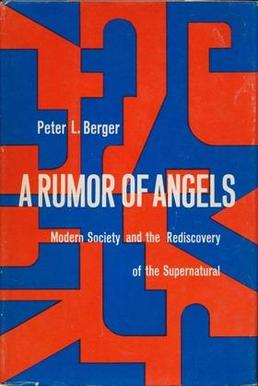
Hindus are people who religiously adhere to Hinduism. Historically, the term has also been used as a geographical, cultural, and later religious identifier for people living in the Indian subcontinent.

New Age is a range of spiritual or religious practices and beliefs which rapidly grew in Western society during the early 1970s. Its highly eclectic and unsystematic structure makes a precise definition difficult. Although many scholars consider it a religious movement, its adherents typically see it as spiritual or as unifying Mind-Body-Spirit, and rarely use the term New Age themselves. Scholars often call it the New Age movement, although others contest this term and suggest it is better seen as a milieu or zeitgeist.
The meaning of spirituality has developed and expanded over time, and various meanings can be found alongside each other. Traditionally, spirituality referred to a religious process of re-formation which "aims to recover the original shape of man", oriented at "the image of God" as exemplified by the founders and sacred texts of the religions of the world. The term was used within early Christianity to refer to a life oriented toward the Holy Spirit and broadened during the Late Middle Ages to include mental aspects of life.

Rajneesh, also known as Acharya Rajneesh, Bhagwan Shree Rajneesh, and later as Osho, was an Indian Godman, philosopher, mystic, and founder of the Rajneesh movement. He was viewed as a controversial new religious movement leader during his life. He rejected institutional religions, insisting that spiritual experience could not be organized into any one system of religious dogma. As a guru, he advocated meditation and taught a unique form called dynamic meditation. Rejecting traditional ascetic practices, he advocated that his followers live fully in the world but without attachment to it. In expressing a more progressive attitude to sexuality he caused controversy in India during the late 1960s and became known as "the sex guru".
Secularity, also the secular or secularness, is the state of being unrelated or neutral in regards to religion. Origins of secularity can be traced to the Bible itself and fleshed out through Christian history into the modern era. In the medieval period there were even secular clergy. Furthermore, secular and religious entities were not separated in the medieval period, but coexisted and interacted naturally.
Gavin D'Costa is the Emeritus Professor of Catholic Theology at the University of Bristol. His academic career at Bristol began in 1993. D'Costa was appointed a visiting professor of Inter-religious Dialogue at the Pontifical University of Saint Thomas Aquinas, Rome.
Radical orthodoxy is a Christian theological and philosophical school of thought which makes use of postmodern philosophy to reject the paradigm of modernity. The movement was founded by John Milbank and others and takes its name from the title of a collection of essays published by Routledge in 1999: Radical Orthodoxy: A New Theology, edited by Milbank, Catherine Pickstock, and Graham Ward. Although the principal founders of the movement are Anglicans, radical orthodoxy includes theologians from a number of ecclesial traditions.
David Frank Ford is an Anglican public theologian. He was the Regius Professor of Divinity at the University of Cambridge, beginning in 1991. He is now an Emeritus Regius Professor of Divinity. His research interests include political theology, ecumenical theology, Christian theologians and theologies, theology and poetry, the shaping of universities and of the field of theology and religious studies within universities, hermeneutics, and interfaith theology and relations. He is the founding director of the Cambridge Inter-Faith Programme and a co-founder of the Society for Scriptural Reasoning.
Susan Jean Palmer is a Canadian sociologist of religion and author whose primary research interest is new religious movements. Formerly a professor of religious studies at Dawson College in Westmount, Quebec, she is currently an Affiliate Professor at Concordia University, and is also the Principal Investigator on the four-year SSHRC-funded research project, "Children in Sectarian Religions" at McGill University in Montreal, where she teaches courses on new religious movements.

In the study of comparative religion, the East Asian religions or Taoic religions, form a subset of the Eastern religions. This group includes Chinese religion overall, which further includes Ancestral Worship, Chinese folk religion, Confucianism, Taoism and popular salvationist organisations, as well as elements drawn from Mahayana Buddhism that form the core of Chinese and East Asian Buddhism at large. The group also includes Japanese Shinto, Tenrikyo, and Korean Muism, all of which combine Shamanistic elements and indigenous ancestral worship with various influences from Chinese religions. Chinese salvationist religions have influenced the rise of Japanese new religions such Tenriism and Korean Jeungsanism; as these new religious movements draw upon indigenous traditions but are heavily influenced by Chinese philosophy and theology.

Linda Jane Pauline Woodhead is a British academic specialising in the religious studies and sociology of religion at King's College London Faculty of Arts and Humanities. She is best known for her work on religious change since the 1980s, and for initiating public debates about faith. She has been described by Matthew Taylor, head of the Royal Society of Arts, as "one of the world's leading experts on religion".
A self religion is a religious or self-improvement group which has as one of its primary aims the improvement of the self. The term "self religion" was coined by Paul Heelas and other scholars of religion have adopted/adapted the description. King's College London scholar Peter Bernard Clarke builds on Heelas's concept of self religion to describe the class of "Religions of the True Self".
Lorne L. Dawson is a Canadian scholar of the sociology of religion who has written about new religious movements, the brainwashing controversy, and religion and the Internet. His work is now focused on religious terrorism and the process of radicalization, especially with regard to domestic terrorists.
"Spiritual but not religious" (SBNR), also known as "spiritual but not affiliated" (SBNA), or less commonly "more spiritual than religious" is a popular phrase and initialism used to self-identify a life stance of spirituality that does not regard organized religion as the sole or most valuable means of furthering spiritual growth. Historically, the words religious and spiritual have been used synonymously to describe all the various aspects of the concept of religion, but in contemporary usage spirituality has often become associated with the interior life of the individual, placing an emphasis upon the well-being of the "mind-body-spirit", while religion refers to organizational or communal dimensions. Spirituality sometimes denotes noninstitutionalized or individualized religiosity. The interactions are complex since even conservative Christians designate themselves as "spiritual but not religious" to indicate a form of non-ritualistic personal faith.
This is a list of encyclopedias as well as encyclopedic and biographical dictionaries published on the subjects of religion and mythology in any language.
In social theory, detraditionalization refers to the erosion of tradition in religion and society in postmodernism.
Hyper-real Religion is a sociological term to describe a new consumer trend in acquiring and enacting religion. The term was first described in the book Religion and Popular Culture: A Hyper-Real Testament by Adam Possamai. The term is used to explore the intersection between postmodernity and religion. The idea has been expanded and critiqued by a number of academics since its creation.

A Rumor of Angels: Modern Society and the Rediscovery of the Supernatural is a 1969 book about sociology by the sociologist Peter L. Berger. The book is one of Berger's most important works on the topic of the sociology of religion. A Rumor of Angels had a profound influence within the American religious establishment as well; his work is frequently cited in church sources.

Modern paganism and New Age are eclectic new religious movements with similar decentralised structures but differences in their views of history, nature, and goals of the practitioner. Modern pagan movements, which often have roots in 18th- and 19th-century cultural movements, seek to revive or be influenced by historical pagan beliefs. New Age teachings emerged in the second half of the 20th century and are characterised by millenarian ideas about spiritual advancement. Since the counterculture of the 1960s, there has been interaction, mutual influence, and often confusion in the popular mind between the movements.






